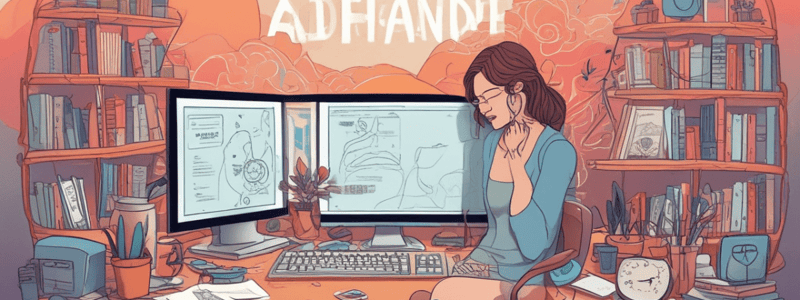Podcast
Questions and Answers
Why do aversive tasks seem too painful to start or complete for individuals with ADHD?
Why do aversive tasks seem too painful to start or complete for individuals with ADHD?
- They lack motivation
- They fear failure
- They experience sensory overload
- They struggle with executive functioning (correct)
What is a suggested method for breaking up large tasks for individuals with ADHD?
What is a suggested method for breaking up large tasks for individuals with ADHD?
- Ignore the task until it becomes urgent
- Delegate the task to someone else
- Break up the task into smaller ones (correct)
- Complete the task all at once
How can individuals with ADHD make unpleasant tasks more manageable?
How can individuals with ADHD make unpleasant tasks more manageable?
- By rushing through them quickly
- By avoiding them altogether
- By pairing them with rewarding activities (correct)
- By procrastinating until they become urgent
How should individuals with ADHD prioritize their tasks?
How should individuals with ADHD prioritize their tasks?
What is a suggested way to create a soothing environment for unpleasant tasks?
What is a suggested way to create a soothing environment for unpleasant tasks?
When should individuals with ADHD schedule unpleasant tasks?
When should individuals with ADHD schedule unpleasant tasks?
How does prioritizing tasks help individuals with ADHD?
How does prioritizing tasks help individuals with ADHD?
Flashcards are hidden until you start studying
Study Notes
- Dr. Tracey Marks is a psychiatrist who makes mental health education videos.
- This video is part of a series on non-medication ways to help with ADHD.
- Procrastination is common with ADHD.
- Aversive tasks seem too painful to start or complete.
- Break up large tasks into smaller ones.
- Pair unpleasant tasks with rewarding activities.
- Prioritize tasks based on urgency and importance.
- Create a soothing environment for unpleasant tasks.
- Schedule unpleasant tasks around natural breaks or pleasurable activities.
- Prioritizing tasks helps reduce wasting time on unimportant things.
Studying That Suits You
Use AI to generate personalized quizzes and flashcards to suit your learning preferences.




